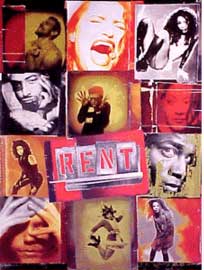
Rent is a rock musical with music, lyrics, and book by Jonathan Larson. Loosely based on the 1896 opera La bohème by Giacomo Puccini, Luigi Illica, and Giuseppe Giacosa, it tells the story of a group of impoverished young artists struggling to survive and create a life in Lower Manhattan's East Village, in the thriving days of the bohemian culture of Alphabet City, under the shadow of HIV/AIDS.

The Sound of Music is a musical with music by Richard Rodgers, lyrics by Oscar Hammerstein II, and a book by Howard Lindsay and Russel Crouse. It is based on the 1949 memoir of Maria von Trapp, The Story of the Trapp Family Singers. Set in Austria on the eve of the Anschluss in 1938, the musical tells the story of Maria, who takes a job as governess to a large family while she decides whether to become a nun. She falls in love with the children, and eventually their widowed father, Captain von Trapp. He is ordered to accept a commission in the German Navy, but he opposes the Nazis. He and Maria decide on a plan to flee Austria with the children. Many songs from the musical have become standards, including "Do-Re-Mi", "My Favorite Things", "Edelweiss", "Climb Ev'ry Mountain", and the title song "The Sound of Music".

The Gay Divorcee is a 1934 American musical romantic comedy film directed by Mark Sandrich and starring Fred Astaire and Ginger Rogers. It also features Alice Brady, Edward Everett Horton, Erik Rhodes, and Eric Blore. The screenplay was written by George Marion Jr., Dorothy Yost, and Edward Kaufman. It is based on the Broadway musical Gay Divorce, written by Dwight Taylor, with Kenneth Webb and Samuel Hoffenstein adapting an unproduced play by J. Hartley Manners.
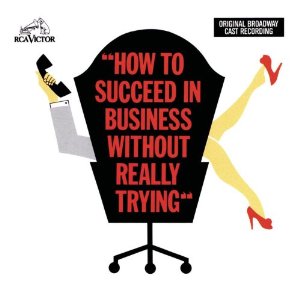
How to Succeed in Business Without Really Trying is a 1961 musical by Frank Loesser and book by Abe Burrows, Jack Weinstock, and Willie Gilbert, based on Shepherd Mead's 1952 book of the same name. The story concerns young, ambitious J. Pierrepont Finch, who, with the help of the book How to Succeed in Business Without Really Trying, rises from window washer to chairman of the board of the World Wide Wicket Company.

The Most Happy Fella is a 1956 musical with a book, music, and lyrics by Frank Loesser. The story, about a romance between an older man and younger woman, is based on the 1924 play They Knew What They Wanted by Sidney Howard. The show is described by some theatre historians and critics as operatic. The original Broadway production ran for 14 months and it has enjoyed several revivals, including one staged by the New York City Opera.

Gay Divorce is a musical with music and lyrics by Cole Porter and book by Dwight Taylor, adapted by Kenneth Webb and Samuel Hoffenstein. It was Fred Astaire's last Broadway show and featured the hit song "Night and Day" in which Astaire danced with co-star Claire Luce.
Hot Spot is a musical with the book by Jack Weinstock and Willie Gilbert, lyrics by Martin Charnin, music by Mary Rodgers, and additional lyrics and music by Stephen Sondheim. It had a brief run on Broadway in 1963. The musical is a political satire.

Come Blow Your Horn is Neil Simon's first play, which premiered on Broadway in 1961 and had a London production in 1962 at the Prince of Wales Theatre. Simon rewrote the script more than two dozen times over several years, resulting in a hit premiere that allowed Simon to leave his full-time television writing career to write stage and film scripts.

Barbara Densmoor Harris was an American Tony Award-winning Broadway stage star and Academy Award-nominated motion picture actress.
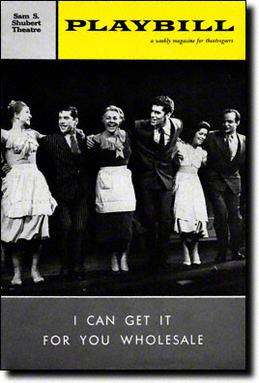
I Can Get It for You Wholesale is a musical originally produced by David Merrick, with music and lyrics by Harold Rome, and book by Jerome Weidman, based on his 1937 novel of the same title. Its 1962 production marked the Broadway debut of 19-year-old Barbra Streisand, who was nominated for the Tony Award for Best Featured Actress in a Musical. The story is set in the New York City Garment District in 1937, during the Great Depression, and the songs utilize traditional Jewish harmonies evocative of the setting and the period of the show.

The Consul is an opera in three acts with music and libretto by Gian Carlo Menotti, his first full-length opera.
Patricia Neway was an American operatic soprano and musical theatre actress who had an active international career during the mid-1940s through the 1970s. One of the few performers of her day to enjoy equal success on both the opera and musical theatre stages, she was a regular performer on both Broadway and at the New York City Opera during the 1950s and 1960s.

After the Fall is a play by the American dramatist Arthur Miller.
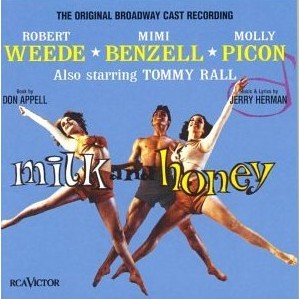
Milk and Honey is a musical with a book by Don Appell and music and lyrics by Jerry Herman. The story centers on a busload of lonely American widows hoping to catch husbands while touring Israel and is set against the backdrop of the country's struggle for recognition as an independent nation. It was Herman's first Broadway book musical following a succession of off-Broadway revues.
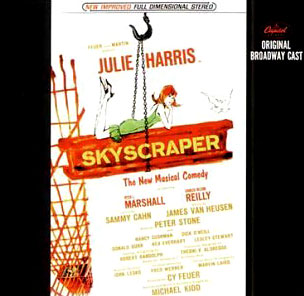
Skyscraper is a musical that ran on Broadway in 1965 and 1966. The book was written by Peter Stone, and the music by Jimmy Van Heusen with lyrics by Sammy Cahn. Based on the 1945 Elmer Rice play Dream Girl, the Broadway production starred Julie Harris in her first musical.

Miriam Ruth "Mimi" Benzell was an American soprano who performed with the Metropolitan Opera before establishing herself as a Broadway musical theatre, television, and nightclub performer.
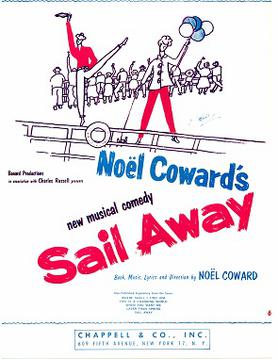
Sail Away is a musical with a book, music and lyrics by Noël Coward. The show was the last musical for which Coward wrote both the book and music, although he wrote the music for one last "book" musical in 1963.
Elaine Malbin is an American soprano who had a prolific international career singing in operas, musicals, and concerts from the 1940s through the 1960s. She made her Town Hall debut at the age of 14. She appeared in a number of Broadway productions in the 1940s and 1950s and notably portrayed Marsinah in the original 1953 West End production of Kismet. She starred on Broadway in the title role of My Darlin’ Aida & sang a season of Gilbert and Sullivan at the Mark Hellinger Theater in New York. She was a regular at the New York City Opera during the 1950s and 1960s with leading roles in Love for Three Oranges, Carmen (Micaela), Turandot (Liù), La Bohème (Mimi) and Don Giovanni (Zerlina). She appeared with most of America's leading opera companies during this time as well, including the Houston Grand Opera and the San Francisco Opera. In San Francisco Malbin debuted in a staged version of Carmina Burnana and sang Mimi in La Bohème. She also appeared in concert with several notable orchestras including the New York Philharmonic and the Philadelphia Orchestra. On the International stage she appeared at a number of opera houses and major music festivals in the United Kingdom, Italy, and France. She performed at the Glyndebourne and Edinburgh Festivals as well as Madama Butterfly with the Scottish Opera Company. She is perhaps best remembered for appearing in several opera roles live for television with the NBC Opera Theatre and for recording two duets with Mario Lanza at RCA on 11 April 1950.
Lee Venora is an American operatic soprano and musical theater actress. She was highly active with the New York City Opera between 1957 and 1967 and a regular performer at the San Francisco Opera between 1961 and 1966. She also appeared in a few Broadway musicals, Lincoln Center revivals, and national tours of musicals during her career. Composer and conductor Leonard Bernstein was an admirer of her voice, and she performed with him and the New York Philharmonic on a number of occasions during the late 1950s and early 1960s. She also sang with the orchestra on a couple of recordings and appears on a few musical recordings as well.
June Card is an American soprano and stage director who had an active career in operas and concerts from 1959 through today. She began her career as a chorus girl on Broadway before moving into opera.














